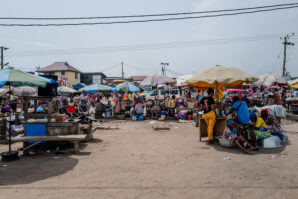Accra’s CLEAN project has had a transformational impact on the lives of informal waste workers, making strides toward their socioeconomic inclusion while also advancing the city’s climate goals.
Over the course of their GCF project, the Accra Metropolitan Assembly engaged 972 waste workers, all of them IDPs, migrants, or refugees. Through a wide range of project activities and in partnership with the grassroots organization, People’s Dialogue, Accra made it easier and safer for these essential workers to do their jobs. The CLEAN project brought over 400 informal waste workers into the formal economy by registering them into formal waste management cooperatives overseen by the city government, ensuring the protection of their labor rights and the stability of their livelihoods. The project also enrolled these migrant waste workers in Ghana’s national health insurance, providing healthcare access for a segment of the population disproportionately exposed to occupational health hazards. The project also delivered skills training to waste workers that led to a 15% increase in job security during the project. As a result of these activities, the city ensured that migrant waste workers have economic stability and access to basic services essential to their long-term inclusion in Accra, while promoting safe and sustainable waste management practices.
The project’s daycare center created a safe space for the children of waste workers, particularly women waste workers, to stay during their caregivers’ workday. Funded by the city’s own budget, the daycare center is educating over 20 children who are now learning rather than spending their days in scrap yards.
Finally, the CLEAN project strengthened the relationship between the Accra Metropolitan Assembly and the city’s migrant community. Through its baseline survey and multi-stakeholder platforms, the city created new channels for communication with migrants and improved its ability to quickly and effectively respond to their needs.







